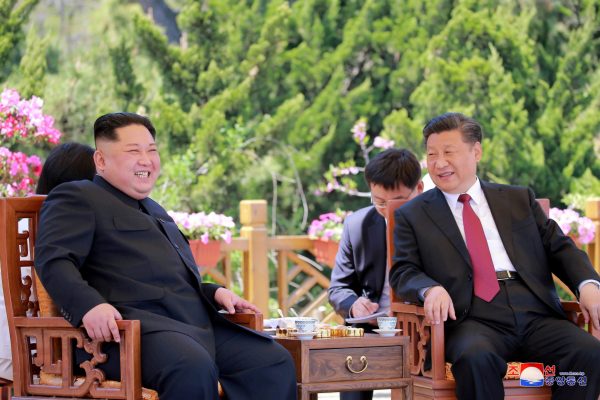Listening to China’s input on how the Korean War should end will increase the odds of establishing a stable and long-lasting peace. As North Korea’s only ally, China maintains strong ideological bonds to Pyongyang via inter-party relations. It is involved in 90 per cent of North Korea’s trade. Political relations between Beijing and Pyongyang have been tense since North Korean leader Kim Jong-un rose to power and China began participating in international sanctions against North Korea. But the relationship has warmed recently.
Kim Jong-un’s visit to China prior to the Inter-Korean Summit showed that the two countries are returning to friendly relations — which will be further reinforced if Xi Jinping visits Pyongyang in the coming months. China has been willing to economically reengage North Korea after a series of diplomatic manoeuvres, including Kim’s state visit to China and Chinese Foreign Minister Wang Yi’s trip to North Korea.
China is also South Korea’s largest trading partner. Seoul’s exports to China have risen from US$2.65 billion to around US$124 billion in goods, equalling 26 per cent of South Korean exports. South Korean imports from China have risen from US$3.73 billion to US$93.7 billion in goods, which make up 22 per cent of South Korea’s total imports. All of this has occurred in the fewer than three decades since the two countries established diplomatic relations in 1992.
On the political front, Beijing has grown closer to Seoul in 2018. Relations improved when the Moon administration confirmed that it would not support further deployments of the US Terminal High Altitude Area Defense system, which led to a reduction in Chinese sanctions on South Korea. South Korean President Moon Jae-in’s statements about his country’s joint history with China during World War II further exuded positive progress in the China–South Korean relationship.
China’s extensive history of involvement on the Korean Peninsula also makes its inclusion in the Korean War peace talks sensible. Since the Han Dynasty, China has maintained a strong relationship with Korea, both when it was united and divided. These centuries spanned a Chinese conquest that lasted hundreds of years during the Han dynasty, Korea’s vassal status during the Ming and Qing dynasties and China coming to Korea’s aid during the Japanese invasions of the 16th century.
Despite China’s alliance with North Korea, Beijing has been willing to apply pressure on Pyongyang to further its own interests as well as those of the international community. The Six Party Talks on North Korean denuclearisation that began in 2003 were China’s first major attempt to mediate on the Korean Peninsula. Throughout the talks, China played the host six times, though the talks ceased when North Korea resumed long-range missile testing in 2009.
As North Korea’s nuclear provocations ramped up in 2016, the international community — largely at the initiative of the United States — pushed China to join sanctions against North Korea. This led to China signing off on United Nations Security Council (UNSC) sanctions to punish North Korea for its fourth nuclear weapons test. Since then, China has consistently supported further UNSC sanctions, as well as implemented unilateral sanctions. Numerous experts have agreed that China’s enforcement of sanctions, although arguably sporadic, has helped to bring Pyongyang to the negotiating table.
Recognising China’s important role in the peace agreement process not only rewards Beijing’s past use of diplomacy to resolve disputes, but also increases its political stake in maintaining peace on the Korean Peninsula.
But the growth of China’s hard power is just as important as the soft-power and diplomatic dynamics. Hard power will allow Beijing to play the role of facilitator or spoiler, depending on the extent of its inclusion in talks. Driven by rapid economic growth, China is making relative gains on the United States in terms of influence in Asia, as exemplified by increases in its defence spending, efforts to modernise its military and its projects in the South China Sea.
Xi Jinping is keen on the ‘great rejuvenation of the Chinese nation’. This means going back to a time when Beijing had the greatest influence in the Asia Pacific and could not be coerced by the West into acquiescence. From its Belt and Road Initiative to repeatedly compelling Vietnam to cease oil exploration activities in the South China Sea, China has largely been successful in moving in this direction.
Beijing’s input in a Korean War peace deal will be needed if Washington wants it to last the test of time. Excluding China will only insult Beijing. If Washington truly desires a peaceful Korean Peninsula, it needs to face reality and give Beijing an equal chair at the negotiating table.
Quinn Marschik is the Assistant Director and Min hee Jo is an Asan Academy Young Fellow of the Center for the National Interest, Washington DC.


Perhaps there is a simple solution.
If the Chinese extended to South Korea the same terms of the Treaty they have with the North.. eg..
Article 2 of the treaty declares the two nations undertake all necessary measures to oppose any country or coalition of countries that might attack either nation.
..then the Chinese would be protecting each Korea from the other as well as from the Americans.
Then they could amicably begin dismantling the rockets, and the Korean Peninsula would cease to be a relic of the Cold War.
Seems obvious.
Wonder why it hasnt happened…